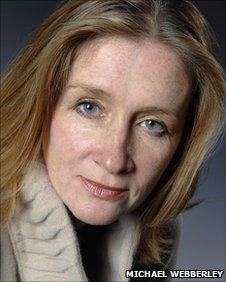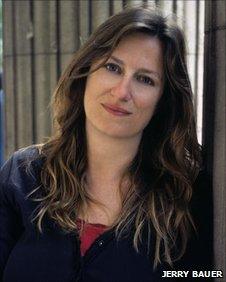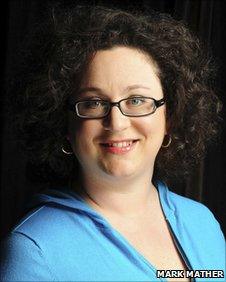Crime writers with killer ideas
- Published
Ahead of Europe's largest gathering of crime writers in Harrogate, we speak to three female novelists who are making their names in the crowded marketplace of crime fiction.
SJ Bolton, external, Elly Griffiths, external and Sophie Hannah, external have all published several novels which explore some of the more unusual sub-genres in the world of murder mystery.
The annual Crime Writing Festival, external begins on Thursday night with the announcement of the Crime Novel of the Year. And veteran crime writer PD James is being honoured with an outstanding contribution award.
SJ BOLTON

Lancashire-born SJ Bolton is the only woman on the six-strong shortlist for Crime Novel of the Year with Blood Harvest.
Her novels have been described as "rural gothic", although Bolton plays down the supernatural element.
"There are no ghosts, but there's an atmosphere of dread and foreboding that is akin to the classic gothic horror novel," she says.
But Bolton, who reveals on her blog, external that she dabbled with a ouija board aged nine, admits: "I've always been fascinated by the nebulous world that sits in parallel to our own."
The Oxford-based author's debut novel Sacrifice was published in 2008. It followed many years working in public relations.
It was a natural progression, she says. The world of PR had taught her the technical skills of writing to a deadline.
"There is a lot of luck in this business. When I finished Sacrifice the market was looking for thrillers with a bit of twist so it was the right book at the right time."
Blood Harvest was inspired by real-life events.
"A few years ago my sister and her family bought a plot of land by an old churchyard on the moors and built a new house," Bolton explains.
"And one day they arrived home to find human remains in their garden. They discovered that it's not unusual for churchyard boundaries to move over time, and for bodies to pop up on the wrong side of the wall.
"It got me thinking, is there a better place to hide a body than in a graveyard?"
SJ Bolton's fourth novel Now You See Me was published in hardback in May. A fifth novel is already written.
"The genre is constantly reinventing itself," she says. "A few years ago we had a trend for increased sexual violence in crime novels, there's been a backlash against that and people are looking to novels that offer wit and originality.
"I think we're seeing the emergence of the clever crime novel."
SJ Bolton will be taking part in Crime Writing Festival panel discussion The Outer Limits on Saturday 23 July.
ELLY GRIFFITHS

Elly Griffiths is the author of three novels set in Norfolk and featuring forensic archaeologist Ruth Galloway. Her most recent book is The House at Sea's End.
The Brighton-based author created her heroine after a chance remark by her archaeologist husband during a holiday on the Norfolk coast.
"He happened to mention how prehistoric man used the marshlands as a sacred burial ground," she recalls.
"In that moment I got the whole plot of the first novel The Crossing Places and there was Ruth walking through the mist towards me - I felt that I knew everything about her."
Griffiths' real name is Dominica de Rosa, which she didn't feel fitted the crime genre.
"It sounds like a made-up name for a romantic novelist," she laughs. "Elly Griffiths is my grandmother's name. It's a bit grittier, it's my Welsh side as opposed to my Italian side."
Having already covered murder mysteries involving the Iron Age, the Romans and World War II, the fourth Ruth Galloway novel - due out next year - involves Aborigine remains in a museum.
Griffiths, who worked in children's publishing before becoming a writer, has been struck how welcoming and friendly the crime fraternity has been.
"I'm not saying that children's writers aren't nice, but in a world that involves cuddly bears it is quite a cut-throat place."
With her style labelled "rural noir", Griffiths has detected a trend in authors setting stories in remote regions.
"It's so difficult to write a crime novel in a world where everyone has a mobile phone and can contact each other. Maybe 'rural noir' is in vogue because in the countryside you can lose that phone signal."
Elly Griffiths will be taking part in Crime Writing Festival panel discussion No Place Like Home on Sunday 24 July.
SOPHIE HANNAH

Sophie Hannah was an established poet before she became a crime novelist.
When we speak by phone she is just recovering from a muddy poetry gig at the Latitude Festival.
"I'm not really a muddy festival sort of person," admits the Cambridge-based writer.
"I was having to read my poems over the sound of a rock band in the next tent. It was pretty close to being my least favourite poetry gig of all time."
As well as five collections of poetry - that are studied at GCSE, A-level and degree level - Hannah is the author of six psychological thrillers.
The latest, Lasting Damage, is out in paperback next month.
Hannah sees a strong relationship between metrical poetry and crime fiction: they share a need for perfect structure.
"In a 14-line sonnet every line and every word has to be doing its bit - each component is supporting the others in a perfect balancing act," she says.
"It's the same in crime fiction. A massive revelation on page 200 needs to be supported by little bits of info you've dropped in chapters three, 11 and 15."
All of Hannah's books have been optioned for TV. Her novel The Point of Rescue was televised on ITV1 in May as Case Sensitive, with Olivia Williams in the lead role of DS Charlie Zailer.
"People who don't like my novels think they're a bit too middle-class," admits Hannah. "The people whose lives are being plunged into a nightmare in my books are never living on grim council estates."
She adds: "My main interest is the way in which our minds make things difficult for us. You can see that far better in the lives of people who have enough money and who in theory should be happy.
"So for psychological thrillers, I think middle-class characters work very well."
Sophie Hannah will be taking part in Crime Writing Festival panel discussion What Lies Beneath on Friday 22 July.
Theakstons Old Peculier Crime Writing Festival runs in Harrogate from 21-24 July.